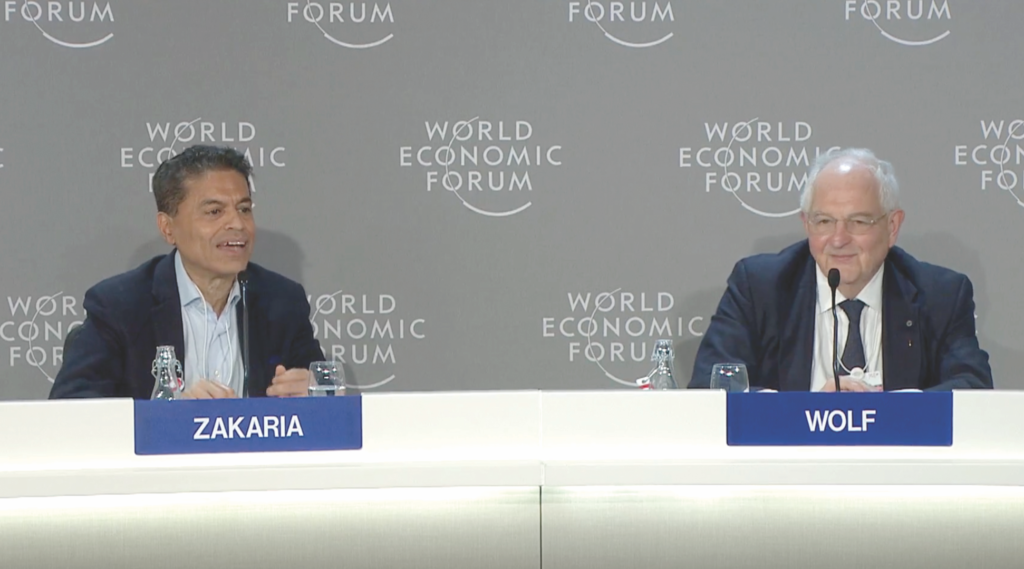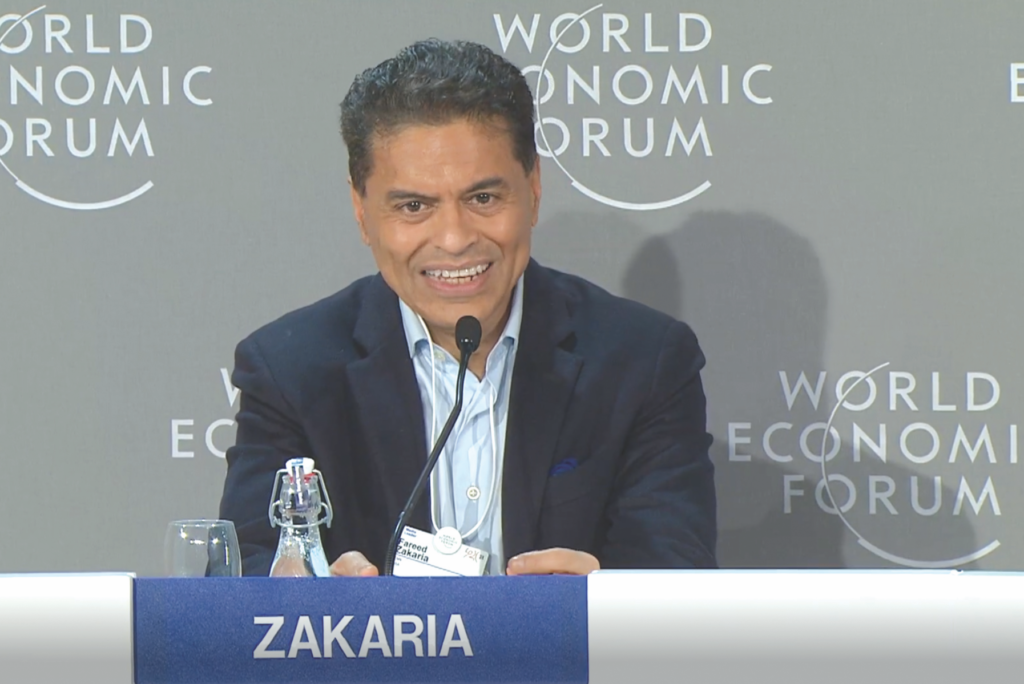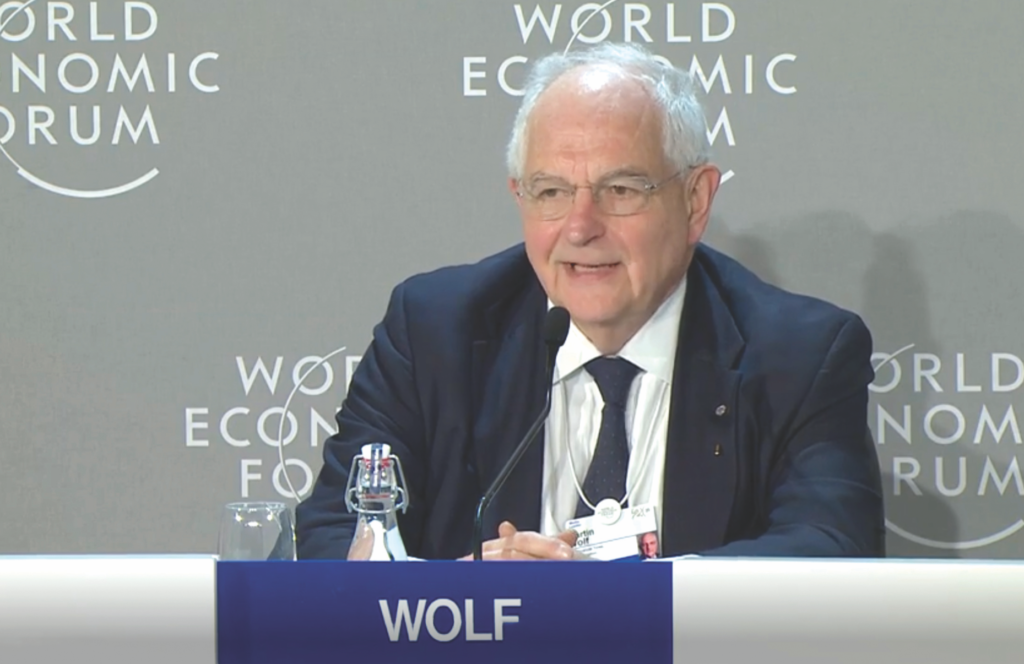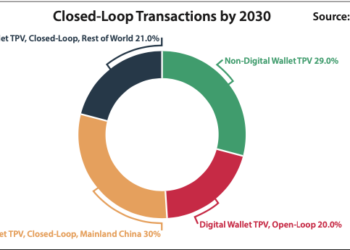The complexities of democratic capitalism, while stimulating prosperity and political and economic freedom, have exposed the dichotomous relationship of a powerful, wealthy class eroding the ethos of shared citizenship. Over time, the market economy has favored the rich, and the rest have been crying foul of a system skewed toward the few. The masses don’t see their elected representatives promoting their interests but aligning with the rich. Such a disconnect allows populist ideas and populist politicians to become mainstream as the restorers of the past glory, which, as evidenced globally, leads to authoritarian populist leaders directing a very dangerous ideology. It is akin to one evil giving way to the rise of a more destructive force. That and more dominated the discussion at the World Economic Forum in Davos when Fareed Zakaria, Host of Fareed Zakaria GPS, CNN, spoke with Martin Wolf, the Associate Editor and Chief Economics Commentator, The Financial Times, on his book Crisis of Democratic Capitalism.
January 19, 2023. Jennifer Paldano Goonewardane.

Fareed Zakaria, Host of Fareed Zakaria GPS, CNN; and Martin Wolf, the Associate Editor and Chief Economics Commentator, The Financial Times.
Often the glamor of democratic politics and the market economy working in tandem is celebrated as the panacea of all ills. And often, the West pushes for that model to prevail upon states vulnerable to authoritarian populist regimes. Their change mantra has often been to make for wide-ranging reforms in the public and political spheres. Conversely, the very existence of democratic capitalism for so long has emerged as an antecedent for populist politics, where integration and diversity get pushed aside amid louder calls for curbs, checks, and balances. Martin Wolf’s latest book – Crisis of Democratic Capitalism, digs into this marriage between market capitalism and democratic liberalism. Given its unmasked fragility, he explores how through the ups and downs of the union, it withstood crisis after crisis through a mutuality that seems to buttress each other and how best to improve the two systems to exist in partnership.
Wolf had spent five summers working through the relationship between democracy and market capitalism. He focuses on some vital questions. Why did democracy emerge after many conflicts out of the development of the market economy? What makes this relationship work? Why is it inherently fragile, and why does it tend to shift into either outright plutocracy or often in a reaction to that demagogic autocracy? Wolf believes that any thriving democracy should base itself on a profound sense of shared citizenship, which centuries ago, the Greeks believed, and Wolf asserts is still true. In the ideal system, people will trust the elites and the system to uphold their interests. In the final analysis, Wolf contends that the people no longer feel that. That trust so propounded in theory no longer exists.
“I define this marriage as one of the complementary opposites. They share a lot. They can support each other a great deal. However, it’s undeniable that inherent in the capitalist system is its tendency towards oligarchy, and inherent in the democratic system, as Plato wrote, is its tendency towards demagogy. And that stress on both sides is what we see now,” says Wolf.
The Basis of the Book
Wolf explores the theme of his books through the lens of an economist. However, as a classics graduate and having read ancient philosophy extensively, he broadly includes philosophy, politics, and economics as an antecedent to this marriage. Wolf uses two other factors, one historical, the other an ever-present threat, to expose the threat to liberal democracy and market capitalism by illiberal autocratic populist leadership. Wolf contends that the world can no longer not be worried about civilized states going rogue. He says that even states taken for granted as being civilized may at any moment in time disintegrate into appalling behavior by compromising and undermining the civilized democratic norms that were hitherto the bedrock of governance. As the offspring of refugees who fled Hitler’s terror campaign, where save for his immediate family, the wider family members lost their lives to the atrocity, Wolf knows how trajectories change. Third, the growing presence of democratic recession, a term from Standford University professor Larry Diamond, in core democracies like America, whose pivotal role since the mid-20th century was to support stable democracy, a function undermined of late with populist rhetoric and given credence with Donald Trump’s election to the presidency.
The Marriage and the Threat
The interweaving of capitalism and democracy emerged in the 17th and 18th centuries. Focusing on the US and the UK, two places he is familiar with, Wolf says that the market economy was a product of the liberal democratic tradition sweeping those countries in those two centuries and after. Republicanism sought to abolish the monarchy and rescind its absolute powers, where personal achievement would override ascribed rights as is present in the monarchy. The principal idea here is to allow personal achievement to determine one’s place in society rather than birth. As Deidre McCloskey points out, liberalism brought about the enrichment of living standards and individual liberties of even the poorest of the poor, a kind of economic disruption and change that the oligarchs and plutocrats in those societies wanted to contain while preserving the rule of law that was essential for their wellbeing but were opposed to power sharing. The only change it seems economic liberalism had produced was replacing ascriptive rights and inheritances with values of personal wealth generation and upward mobility. The wealthy still wanted the traditional virtues to prevail without the ascriptive rights while power remained with them.
Power to the People
But the new liberal market economy stimulated an enrichment that brought about profound changes to people’s living standards and their way of thinking about the role of government in regulating the economy and businesses. Moreover, as the market economy progressed, employers were looking for educated employees and pushing for education among the workforce, which the employees desired as this thrust gained momentum, more in the 19th century, when a universally educated population molded on the premise that everyone’s equal, demanded a role in government. They wanted a say in politics. That meant that people demanded their right to vote. No longer could the government dictate lines of power by continuing franchise restrictions. Equality became central to political debate. That meant states had to consider many groups and entities for enfranchisement. But the ruling elites in America and the UK worried. Too much power to the masses through mass-scale enfranchisement could lead to the wealthy being forced to bequeath their properties. The enfranchisement movement was a 100-year process. There was pressure on governments to remove franchise restrictions and incorporate various groups into the reforms, including the trade unions, the working class, organized cities, and the educated. There prevailed the debate on bringing about the universal enfranchisement of ethnic minorities and the abolition of slavery. The UK saw several reforms, each widening the franchise, each reform making the next extension inevitable and culminating with the universal enfranchisement of women in 1931.
The Threat to Capitalism
So why is there a threat to capitalism today, where societies seem to be moving to an illiberal democratic model? Wolf provides his analysis. The Yin and Yan, as Wolf describes, of the marriage between liberal democracy and market capitalism is that over time in a democracy, a significant amount of political power gets concentrated with the wealthy. Wealth begets a self- reinforcing system where the system gets gradually rigged for the benefit of the economically powerful. Therefore, cumulatively, the market becomes less competitive, capitalist, and open. Wolf points out that much research support this outcome. The outcome is a less dynamic capitalist system and a significantly more oligopolistic with adverse income distribution shifts, which leads to discontent among the masses. That situation became reinforced by the significant economic changes sweeping the world, particularly globalization.
The Rise of the Protector
The Great Depression, preceded by Theodore Roosevelt’s focus on social justice vis a vis economic and social inequality through progressivism, produced a tremendous reaction against oligarchic capitalism. That gave way to a much better form of capitalism in the middle of the 20th century with the introduction of the welfare state. Post-1980s are witnessing an erosion of that with a less dynamic capitalist system and a distorted democratic system where the lines between power and wealth are blurring. The more a state moves in an oligarchic direction, the more it moves to a situation where power gets concentrated in the hands of the wealthy. In the US, there is already a remarkable amount of evidence regarding policymaking across a wide range of areas, says Wolf.
As a result, the people start feeling that the state and the system are not working for them. Trust erodes. As Plato described, such a society then requires a “protector.” The famous slogan is a protective demagogue who will put himself before the people. Wolf points out that, funnily, the demagogue has always been a “him” who will save everybody from this disaster. In other words, the demagogue tells the people to give him all the power he needs to contain the crooks. He promises to put them in their place and care for the people. So, Wolf says this bargain between the demagogue and the people who have the vote can work on the left or the right. But Wolf points out that in today’s systems, there is an exciting twist to this relationship. The oligarchy works quite well as long as they get a demagogue whose deal is with the people. The agreement promises to look after them by bashing foreigners and outsiders, quietly lowering taxes, and making everybody feel economically much better. And this is the exact model of right-wing populism today that Wolf points out in his book.
Wolf says Brexit is another example of exploitation by politicians of people’s fears. The government was seen as making decisions as part of the European Union, hurting most of the population—a situation exacerbated by the emergence of right-wing populists blaming Europe for all the ills. Boris Johnson jumped on the same bandwagon as he deemed it an expedient political platform that could catapult him to power. The results are plain to see. Right-wing populism got Britain out of its political problem. But the so-called Brexit disaster has only added to people’s problems. Wolf points out that history has shown that autocratic demagogues lack policy competence, which becomes a vicious cycle. It turns out to be a bad government with more disappointed people. Then there would be new demagogues and more autocracy. This trend, Wolf says his Latin American friends have pointed out, has been a big part of their story. Wolf contends that a significant part of Brexit and MAGA rhetoric was about nostalgia and lost status and the anxiety associated with lost status and how those fears were taken heed by populist politicians who rose to power, making it their platform slogan, but once in power, maintained the status quo of the wealthy.
The new liberal market economy stimulated an enrichment that brought about profound changes to people’s living standards and their way of thinking about the role of government in regulating the economy and businesses.
Minority Politics as a Populist Weapon
In a society with diverse populations, it’s easy for populist politicians to target their rhetoric against them. The core political strategy of right-wing populists is to mobilize people against elites, intellectuals, some business leaders, particularly the woke ones, and various groups of outsiders. That has happened again and again throughout history, even during the interwar period in Europe. How far was this significant? There are two interesting points if you look at it empirically. Wolf explains that every high-income western country, except Japan and Korea, has very substantial rises in the proportion of the foreign-born population. Closer scrutiny shows that the countries hostile to immigration are not the countries that have had the most significant increase in foreign-born people in their populations. He points out that Spain and Switzerland are two countries with many foreign-born people, but right-wing populist rhetoric against immigration and minorities hasn’t dominated the political platform.
On the other hand, the US has had a relatively minor increase in its foreign-born population. Wolf says that more study is required to find the linkages to this phenomenon. Wolf concludes that the probability is that as long as there are foreigners or minorities around, it doesn’t matter how many there are to mobilize people against them and make them the basis of a political movement. Wolf calls it political entrepreneurship.
A phenomenon weaponized for one’s benefit. Wolf acknowledges that immigration has become a fundamental issue for many states. Considering democracy as the end point of political liberalism, accompanied by the view that all human beings have equal value, creates a conflict, says Wolf.
The Answer
Wolf suggests introducing an economic system where everybody sees opportunities to improve. The tax system reform is part of that, points out Wolf. The income tax is dysfunctional for a massive amount of the elite. Hence reforming the tax system is a core issue in those reforms.
For fair play to define democratic capitalism and to ensure that more states don’t fall to the lure of right- wing populism and demagogues, Wolf suggests pushing the growth and distribution agenda along the lines of an active competition policy, something under serious discussion in the US. He says states must focus on accelerating growth and making it more widely shared while achieving sustainability. It should be an economic agenda to make societies feel better and work better. According to Wolf, it will take long and even politically impossible without political reforms. Wolf being part of discussions on political reforms, some of which he describes as insanely radical, says that some discussions focus on reintroducing the Principle of the Selection by Lot, the Athenian way of exercising political power and electing leaders.







